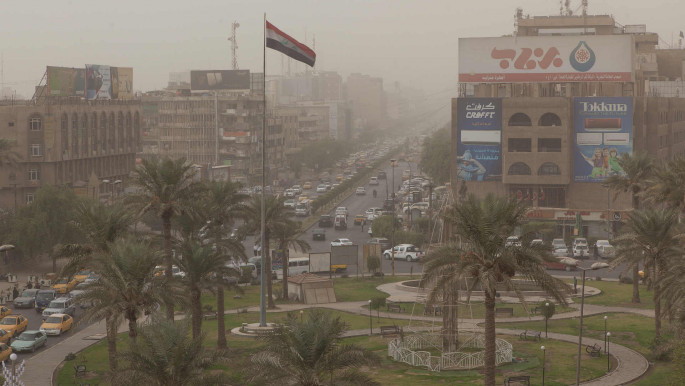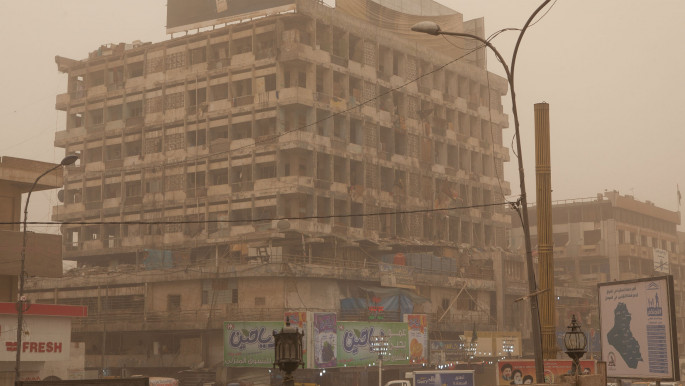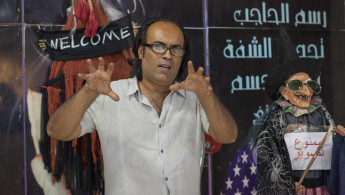'Frankenstein in Baghdad' sparks Hollywood elite into life
Already translated into French, English, Hebrew, Mandarin, Cantonese, Turkish and Bosnian, the Iraqi novel is widely considered an international success. Still, the story is poised to attract a larger audience and generate even more attention; five production companies have reportedly contacted Saadawi to adapt his novel to a movie.
"George Lucas liked the history of the book and suggested he could produce of the cinematic adaptation. What I can tell you it is that partnership was signed between ImageNation Abu Dhabi and an English company, the name of which I cannot say," Saadawi reveals.
After years of television reports focused on attacks, wars, militias and terrorists, Saadawi believes Iraq's public image needs to be restored and reshaped: "We have extraordinary and beautiful people here."
Determined to uphold the artistic integrity of his story, Ahmed Saadawi wrote conditions in the contract to ensure strict control over the final film. "The movie will have to stick to what I wrote," Saadawi says, firmly.
"Through art, we can have a message and a language transcribed all over the world. Art makes a bridge with the foreigner so that they can know our culture."
Like the book, the upcoming film will, in spite of its darkness, explain the wreck of an often misunderstood country.
Dark period
Sitting in Cafe and Book, a popular coffee house in Karrada, - a Shia and Christian district of Baghdad - Saadawi recalls the origins of his novel: "The story came to me in a cold room of a hospital."
It was 12 years ago, Iraq was torn apart by the civil war and Ahmed encountered a scene that left him speechless.
 |
|
| The violence Saadawi witnessed inspired him to write about everyday life in post-Saddam Baghdad [Sebastian Castelier] |
"I found there a man crying because his brother had died in a big attack. Families came to identify bodies of their relatives but this man couldn't find his brother. A male nurse told him to check in another room, reserved for body parts and flesh. He was asked to collect what he could find to compose an entire corpse," says Saadawi.
Between 2004 and 2009, tens of thousands of civilians were killed in sectarian conflicts which desecrated Iraq during its civil war. During this dark period, Baghdad was particularly affected, with few districts spared from suicide attacks.
In Karrada, there were 324 victims on the night of July 2, 2016. In such a context, death loses its exceptional nature.
"There are many Frankensteins in Iraq. Everywhere," says Saadawi. There is a story told in the Shia community, he says. "It is the story of a thief. He was taken to Imam Ali, who ordered his hand to be cut off. Once his hand was cut, the thief began crying, and read aloud a poem to praise Ali. His text shows love for his leader, who became an executioner. After that, Imam Ali collected the hand, severed on the ground, put his shawl over it, and read some holy words of the Quran. The hand was then returned to the arm of the thief. It was a miracle."
A family of Frankensteins
In the book Frankenstein in Baghdad, Hadi, a garbage collector in the Iraqi capital, collects pieces of bodies scattered after attacks. Secretly he assembles them and sews them together. Of these body parts, a monster comes to life and demands vengeance from those who scattered his limbs across the streets.
This Iraqi Frankenstein is named "Without Name". He is at the same time a victim and an executioner. Victim in his nature and executioner in the misunderstanding and the fear which he evokes from the population.
 |
|
| Saadawi believes Iraq's public image needs to be restored [Sebastian Castelier] |
Inspired by the violence of his everyday life in the post-Saddam Baghdad, Ahmed asserts he drew equal inspiration from events in his youth as well. "War in Iraq is not recent. We have behind us more than 40 years of war, how can we forget it and get out of it?"
The novelist was personally affected as his six uncles on his father's side paid the price for eight years of terrible confrontations between Iraq and Iran, from 1980 to 1988.
"Oh my god, you have a family of Frankensteins," people tell him in the coffee shop.
The writer acknowledges this connection, but continues listing other stories to demonstrate the scale of the horror.
"My neighbour for example. His son died during the war so they did his burial. The third day, a young man came to their place and asked to meet the father. His son was also killed in the war and he was asked to go to identify the body. The shock was so terrible for the father that his legs stopped working."
A misfortune 'Without Name'
"Before, an Iraqi could wonder: who am I? Am I an Iraqi, a Kurd, a Turkmen, a Christian, a Sunni, a Shia? If your personality was different, people made of you an enemy," says Saadawi, refusing to incriminate neither communities, nor political figures.
The bloody misfortune of Iraq belongs to the responsibility of every Iraqi citizen and their ignorance about each other. This dangerous unknown, he says, is symbolised by the character of "Without Name".
Quentin Muller is a French journalist specialising in issues of the Middle East and North Africa.
Follow him on Twitter: @MllerQuentin



